#bc i hav Opinions dammit
Text
The Queer Appeal of Sk8
Recently @mulberrymelancholy reblogged a post of mine with a truly galaxy brain take about how Sk8 “is a show made for queer fans” and generally how sports anime often depicts love and relationships in a way that’s more accessible and relatable to ace/arospec people than other mainstream media does.
Just, *chef’s kiss* fucking brilliant. I urge you to read their post here (note I’m referring to the reblog not the actual post).
And basically, it got me thinking about this concept of Sk8 as a Queer Show, and the kinds of stories and dynamics that tend to attract queer audiences in droves, regardless of whether its queerness is made explicit or hell, whether that queerness was intended.
And that’s what I’ve been pondering: What are the cues, markers, or coding, in Sk8 that set off the community’s collective gaydar?
I obviously can’t speak for the community. So here’s what aspects of the show intrigued me and what, for me, marks Sk8 as a Queer Show beyond the subtextual queer romances: a punk/alternative aesthetic, Found Family, Shadow as a drag persona, and The Hands.
1.) The Punk Aesthetic
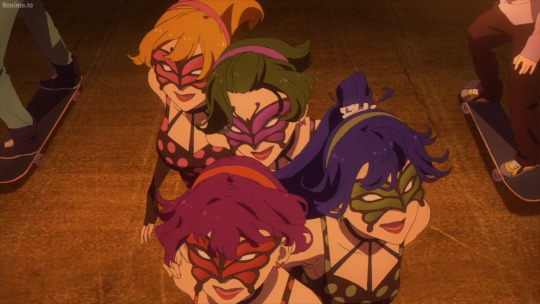
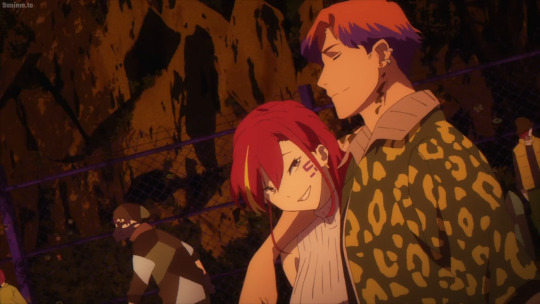
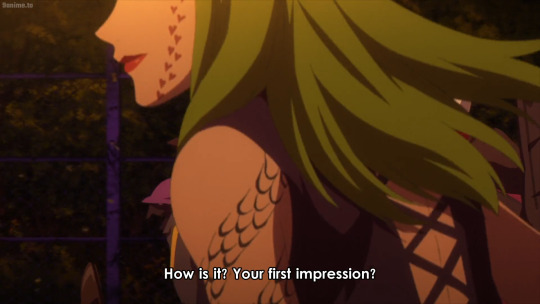
All three of the above screenshots are taken from Ep 1, and every single one of them depicts background characters. They’re nameless and ultimately unimportant characters, yet each of them designed so distinctly and so unique from one another, one could mistake each of them for the main character(s) of another story.
Of what little I know about Punk subculture, I do know this: that the ethos of Punk is heavily built around a celebration of individuality and non-conformity. Sk8 seems to have incorporated this ethos into the very fabric its worldbuilding, and the aesthetics and culture upon which it takes inspiration appeals specifically to a queer audience.
I don’t really need to explain why Punk has such deep ties with the queer community. For decades, queer people have found community and acceptance within punk spaces, and punk ideology is something that I think is just ingrained in the queer consciousness as both lived experience and a survival tactic.
Therefore, a show that adopts punk aesthetics is, by association, already paying homage to Queer culture, intentional or not.
Queer fans notice this- like recognizes like.
2.) Found Family
This also needs little explanation.
Too often, queer individuals cannot rely on their “born into” families for support and acceptance. Too often, we are abused, neglected, and abandoned by those who we were taught would “always be there for us.”
And so, a universal experience for queer people has been redefining the meaning of Family, having to build our families from scratch, finding brothers, sisters, mothers, and fathers in people with whom we have no blood relation, and forming communities tied together by shared lived experience rather than shared genetics.
And this idea of Found Family is also built into Sk8′s narrative.
Like, for example, the way that Reki promises MIYA that he and Langa will “never disappear from [his] sight,” filling the void that MIYA felt after his friends abandoned him.
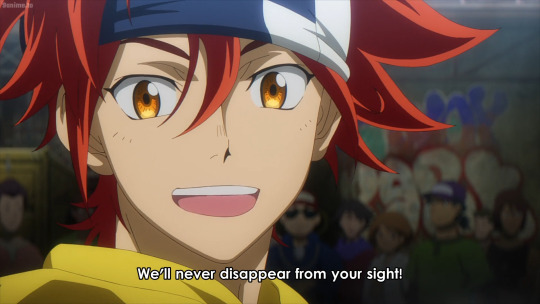
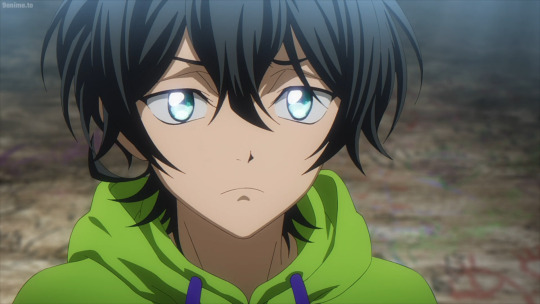
And in the way that JOE becomes a paternal figure for Reki, teaching him ways to improve in skateboarding, and ensuring that Reki doesn’t self isolate when he’s feeling insecure.
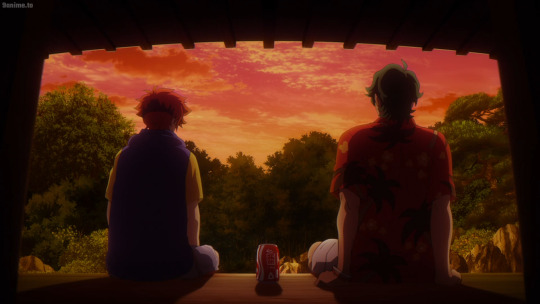
And in the whole Ep 6 business with Hiromi acting as babysitter to the Gang.
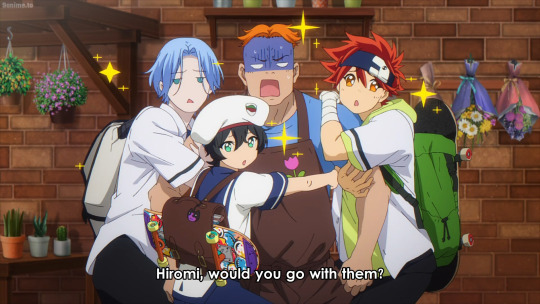
Hell, even ADAM (derogatory) is associated with this trope. Abused as a child, he finds solace in an underground skateboarding community and culture he helped create- his own found family (or some powertrippy version of it anyway).
Again, queer fans see themselves depicted in the show, but this time in the way that the show gives importance to Found Family relationships between its characters.
3.) Shadow and Drag
This is one that’s more of an association that I personally made. But I was intrigued by the way that Hiromi adopts his SHADOW persona. He wears SHADOW like a mask, and adopts a personality seemingly so opposite to his day-to-day behavior.
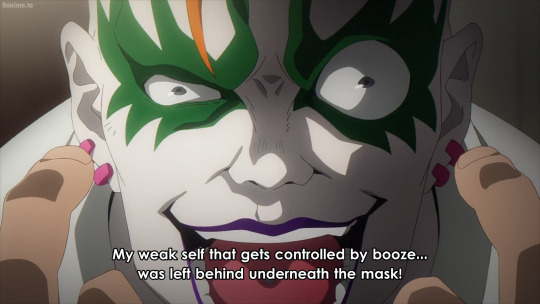
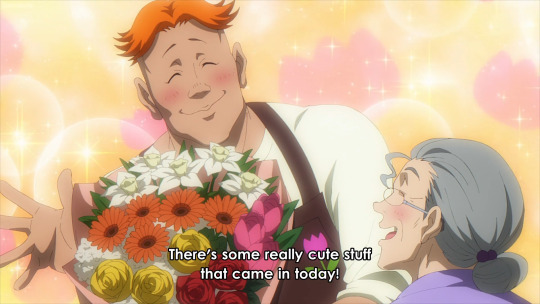
Further, the theatricality and general “gender fuckery” of his SHADOW persona, to me, just seemed so similar to a the characteristics of a drag persona (I don’t know a whole lot about drag but enough that I’m drawing superficial similarities).
There’s also this aspect of a “double life” that he, and actually all the other adult characters of the show, have to adopt, which is a way of living that I’m sure a lot of queer viewers see themselves reflected in.
4.) The Hands
Ohhhh the Hands.
One of the things I noticed very early on is the way the show constantly draws our attention to Reki’s hands, which I thought was a little strange for an anime about skating. After all, skating doesn’t really involve the hands, or at least the show doesn’t really draw attention to hands within the context of skating.
I count 3 times so far between Eps 1-9 in which hands are the focus of the frame.
First, when Reki teaches Langa how to fist pump after Langa lands his first ollie, second, when Reki and Langa make their Promise, and finally, when Langa saves Reki from falling off his board.
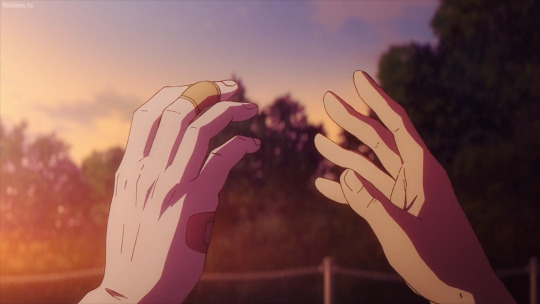
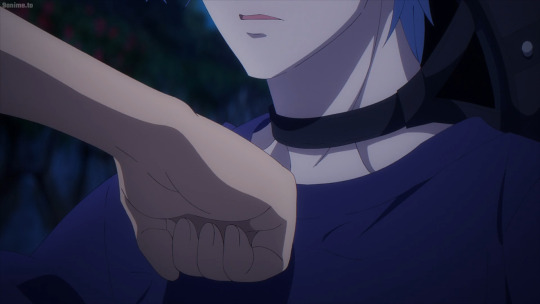
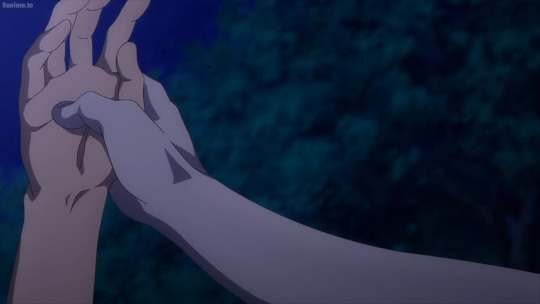
And you know what they say, twice is a coincidence but thrice is a motif (no one else actually says this I think I’m the only one who says this lol).
I’m not really certain why hands seem to be such a shared fixation among queer people (at least among those I interact with). All I know is that gay people are just fucking obsessed with them.
I have a Theory as to why, and at this point I’d love for other people to chime in and “compare notes” if you will, but I think it basically has to do with repression. And in the same way that queer people have had to redefine the meaning of family, we’ve also had to redefine intimacy.
Being overtly physically affectionate with someone of the same sex, even if they’re your significant other, or often specifically BECAUSE they’re your significant other, can still be dangerous, even now despite the “progression” of society. Queer people know this, this vigilant surveillance of our environment and ourselves, always asking ourselves, “Am I safe enough to be myself?”
Already, Western culture is pretty touch-averse. That is, it’s considered taboo to touch someone unless they’re a family member or a romantic partner. And to touch a person of the same sex in any way that could be misconstrued as romantic (which is most things tbh) is a big no no.
There’s just A Lot to unpack there.
But basically I think that queer people, by necessity, have had to learn to romanticize mundane or unconventional ways of being physically intimate so that we can continue to be romantic with one another without “being caught” so to speak.
Kissing and hugging is too obvious. But a handshake that lingers for just a second too long is much more likely to go unnoticed, braiding someone’s hair can easily be explained away as just lending a helping hand, touching palms to “compare hand sizes” is just good fun.
But for queer people, these brief and seemingly insignificant touches hold greater meaning, because it’s all we are allowed, and all we allow ourselves, to exchange with others.
God, I’ve gone off and rambled again. What’s my point? Basically that the way the show draws attention to Reki’s hands, and specifically how they’re so often framed with Langa’s hands, is one of the major reasons why I clocked Sk8 as a Queer. It’s just something that resonated with me and my own experience of queerness, and I know that I’m not the only one who noticed either.
~
So in conclusion, uhhhh yeah Sk8 the Infinity is just a super gay show, and it’s not even because of the homo-romantic subtext (that at this point is really just Text).
Because what’s important to understand is that Queerness isn’t just about same-sex romance.
Queer Love isn’t just shared between wives/girlfriends, husbands/boyfriends, and all their in-betweens. Queer Love can be two best friends who come out together, queer siblings who rely and support one another, a gay teacher who helps guide one of their questioning students, a queer community pitching in to help a struggling member.
And that all ties with another important thing to consider, that what we refer to as the “queer experience” or “queer culture” isn’t universal. In fact, it wrongly lumps together the unique experiences and struggles of queer BIPOC all under one umbrella that’s primary White and middle class.
So I think what drives a lot of my frustration about labeling a show like Sk8 as Queerbait is this very issue of considering queerness and queer representation within such narrow standards, and mandating that a show must pass a certain threshold of explicit queerness to be considered good representation.
I get that someone might only feel represented by an indisputable canonization of a same-sex couple. That’s fine. But labeling Sk8 as Queerbait for that reason alone ignores the vast array of other queer experiences.
The aspects of Sk8 that resonate most deeply with my own experiences of queerness is in the way that Reki and Langa share intimacy through skating (intricate rituals heyo). For me, them officially getting together ultimately doesn’t matter- I’ll consider Sk8 a Queer show regardless.
Similarly, @mulberrymelancholy finds ace/arospec representation in that very absence of an on-screen kiss. A bisexual man might find representation in Reki, not because he enters a canon relationship, but in the depiction of Reki’s coming of age, growing up and navigating adolescent relationships. A non-binary person might feel represented through CHERRY’s androgyny.
That’s the thing, I don’t know how this show will resonate with other members of the queer community, and it’d be wrong to make a judgement on Sk8′s queer representation based on my experiences alone.
That being said, Straight people definitely don’t get to judge Sk8 as Queerbait. Y’all can watch and enjoy the show, we WANT you to enjoy these kinds of shows, and we want you to share these shows and contribute to the normalization and celebration of these kinds of narratives.
But understand that you don’t have a right to tell us whether or not Sk8 has good or bad queer representation.
And even members of the queer community are on thin ice. Your experience of queerness is not universal. Listen to the other members of your community, and respect that what you might find lacking in this show may be the exact representation that someone else needs.
#and scene#i was up till 4am writing this instead of doing my hw#bc i hav Opinions dammit#sk8#sk8 the infinity#sk8 meta#sk8 theory#queerbait
286 notes
·
View notes